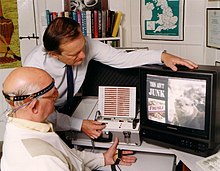
Back Sielkundige Afrikaans نفساني Arabic মনোবিজ্ঞানী Assamese Psicólogu AST Psixoloq Azerbaijani روانشناس AZB Sikologo BCL Псіхолаг Byelorussian སེམས་ཁམས་རིག་པ་བ། Tibetan دەروونناس CKB
 | |
| Occupation | |
|---|---|
| Names | Psychologist |
| Description | |
| Competencies | Psychotherapy, psychological assessment and testing, depends on specialty |
Education required | Differs by jurisdiction, typically a terminal degree such as PsyD or PhD |
Fields of employment | Clinical neuropsychology, clinical, Medical, community, counselling, educational and developmental, forensic, health, organisational or sport and exercise |
Related jobs | |
A psychologist is a professional who practices psychology and studies mental states, perceptual, cognitive, emotional, and social processes and behavior. Their work often involves the experimentation, observation, and interpretation of how individuals relate to each other and to their environments.[1]
Psychologists usually acquire a bachelor's degree in psychology, followed by a master's degree or doctorate in psychology. Unlike psychiatric physicians and psychiatric nurse-practitioners, psychologists usually cannot prescribe medication, but depending on the jurisdiction, some psychologists with additional training can be licensed to prescribe medications; qualification requirements may be different from a bachelor's degree and master's degree.
Psychologists receive extensive training in psychological testing, communication techniques, scoring, interpretation, and reporting, while psychiatrists are not usually trained in psychological testing. Psychologists are also trained in, and often specialize in, one or more psychotherapies to improve symptoms of many mental disorders, including but not limited to treatment for anxiety, depression, post-traumatic stress disorder, schizophrenia, bipolar disorder, personality disorders and eating disorders. Treatment from psychologists can be individual or in groups. Cognitive behavioral therapy is a commonly used, well studied[2] and high efficacy psychotherapy practiced by psychologists.[3] Psychologists can work with a range of institutions and people, such as schools, prisons, in a private clinic, in a workplace, or with a sports team.[4]
Applied psychology applies theory to solve problems in human and animal behavior. Applied fields include clinical psychology, counseling psychology, sport psychology, forensic psychology, industrial and organizational psychology, health psychology and school psychology.[5] Licensing and regulations can vary by state and profession.[1]
- ^ a b "Psychologists : Occupational Outlook Handbook: : U.S. Bureau of Labor Statistics". www.bls.gov. Retrieved 24 September 2019.
- ^ Cognitive behavioral therapy. Institute for Quality and Efficiency in Health Care (IQWiG). 8 September 2016.
- ^ David, Daniel; Cristea, Ioana; Hofmann, Stefan G. (29 January 2018). "Why Cognitive Behavioral Therapy Is the Current Gold Standard of Psychotherapy". Frontiers in Psychiatry. 9: 4. doi:10.3389/fpsyt.2018.00004. ISSN 1664-0640. PMC 5797481. PMID 29434552.
- ^ "Psychologists and psychology". Healthdirect. October 2019.
- ^ "What is Applied Psychology? Top Applied Psychology Careers". www.gmercyu.edu. Retrieved 1 October 2019.